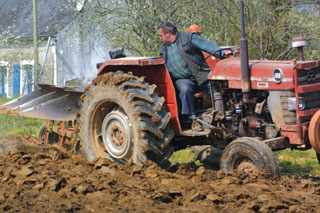
Features
Production
Research
Conventional plowing is “skinning” agricultural fields
March 6, 2008 By Marg Land
Traditional plow-based agricultural methods and the need to feed a rapidly growing world population are combining to deplete the Earth’s soil supply, a new study confirms.
 |
| According to University of Washington professor Dr. David Montgomery, long-established agricultural practices – such as plowing – appear to increase soil erosion to the point that it is not offset by soil creation. |
Traditional plow-based agricultural methods and the need to feed a
rapidly growing world population are combining to deplete the Earth’s soil supply, a new study confirms.
In fact, long-established practices appear to increase soil erosion to the point that it is not offset by soil creation, says Dr. David Montgomery, a University of Washington professor of Earth and space sciences.
No-till agriculture is far more sustainable, he says.
“Soil loss through conventional agri-culture is in a range of 10 to 100 times greater than the rate at which soil is created,” says Dr. Montgomery. “No-till agriculture brings it into the ballpark, surprisingly close to being balanced with soil creation.”
Dr. Montgomery looked at data from more than 1,650 measurements published in more than 200 studies examining various aspects of farming practices, soil creation and erosion.
Long-term erosion rates worldwide average less than one-tenth of a millimetre per year, which is similar to the rate at which soil is produced through mechanical, chemical and biological processes that dissolve rock and mix the grains with organic matter. The research shows that erosion rates consistently exceed one millimetre a year – less than a half-inch per decade – only in steep alpine terrain, and plowed fields erode at about the same pace as the Himalayas, home to the highest mountain peaks in the world.
“We are skinning our agricultural fields,” Dr. Montgomery says. “But there are methods of farming, no-till in particular, that don’t have to lead to that result.”
He notes that as oil becomes more expensive and less available, it will be even more important to preserve soil fertility through methods such as no-till farming, which requires less fertilizer and many fewer passes with a tractor.
No-till farming can build soil fertility even with intensive farming methods, he said, and it could prove to be a major benefit in a warming climate. By stirring crop residue into the soil surface, no-till farming can gradually increase organic matter in soil, as much as tripling its carbon content in less than 15 years.
“Returning the organic matter to the soil stores carbon,” Dr. Montgomery says. “If all farms on the planet were converted to no-till, the range of estimates for sequestered carbon runs from 10 per cent of current carbon emissions to about half.
“It’s one of the few win-win options in trying to forestall the effects of
climate change.” ❦
Print this page